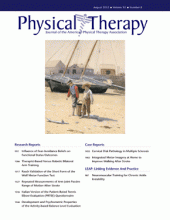Abstract
Background The construct validity and reliability of the short form of the Wolf Motor Function Test (S-WMFT) in people with subacute stroke and chronic stroke (S-WMFT subacute stroke and chronic stroke versions) have not been investigated.
Objective The purpose of this study was to investigate the dimensionality, item difficulty hierarchy, differential item functioning (DIF), and reliability of the S-WMFT subacute stroke and chronic stroke versions in people with mild to moderate upper-extremity (UE) dysfunction.
Design This was a secondary study in which data collected from randomized controlled trials were used.
Methods Data were collected at baseline from 97 people with chronic stroke (>12 months after stroke) and 75 people with subacute stroke (3–9 months after stroke) at 3 medical centers in Taiwan. Test structure, hierarchical properties, DIF, and reliability were assessed with Rasch analysis.
Results The test structure for both versions was unidimensional. No DIF relevant to sex, age, or stroke location (hemispheric laterality) was detected. The tasks of moving a hand to a box and moving a hand to a table in the S-WMFT for subacute stroke showed a significantly high correlation. The reliability coefficients for both versions were approximately .90.
Limitations The findings were limited to people with stroke and mild to moderate impairment of UE function.
Conclusions The S-WMFT subacute stroke and chronic stroke versions are useful tools for assessing UE function in different subgroups of people with stroke and show evidence of construct validity and reliability. A high correlation between the tasks of moving a hand to a box and moving a hand to a table in the S-WMFT for subacute stroke suggests that the removal of 1 of these 2 items is warranted.
Footnotes
Dr Hui-fang Chen, Dr Wu, Dr Lin, and Dr Hsieh-ching Chen provided concept/idea/research design. Dr Hui-fang Chen, Dr Wu, and Dr Lin provided writing. Dr Wu, Dr Lin, and Dr Hsieh-ching Chen provided data collection. Dr Hui-fang Chen provided data analysis. Dr Wu and Dr Lin provided project management, fund procurement, and institutional liaisons. Dr C.P-C. Chen and Dr C. Chen provided participants and facilities/equipment. All authors provided consultation (including review of manuscript before submission).
Institutional review board approval for this study was obtained from the study sites.
This project was supported, in part, by the National Health Research Institutes (NHRI-EX99-9920PI and NHRI-EX100-10010PI), the National Sciences Council (NSC 97-2314-B-002-008-MY3 and NSC 99-2314-B-182-014-MY3), and the Healthy Ageing Research Center at Chang Gung University (EMRPD1A0891) in Taiwan.
- Received May 27, 2011.
- Accepted April 27, 2012.












